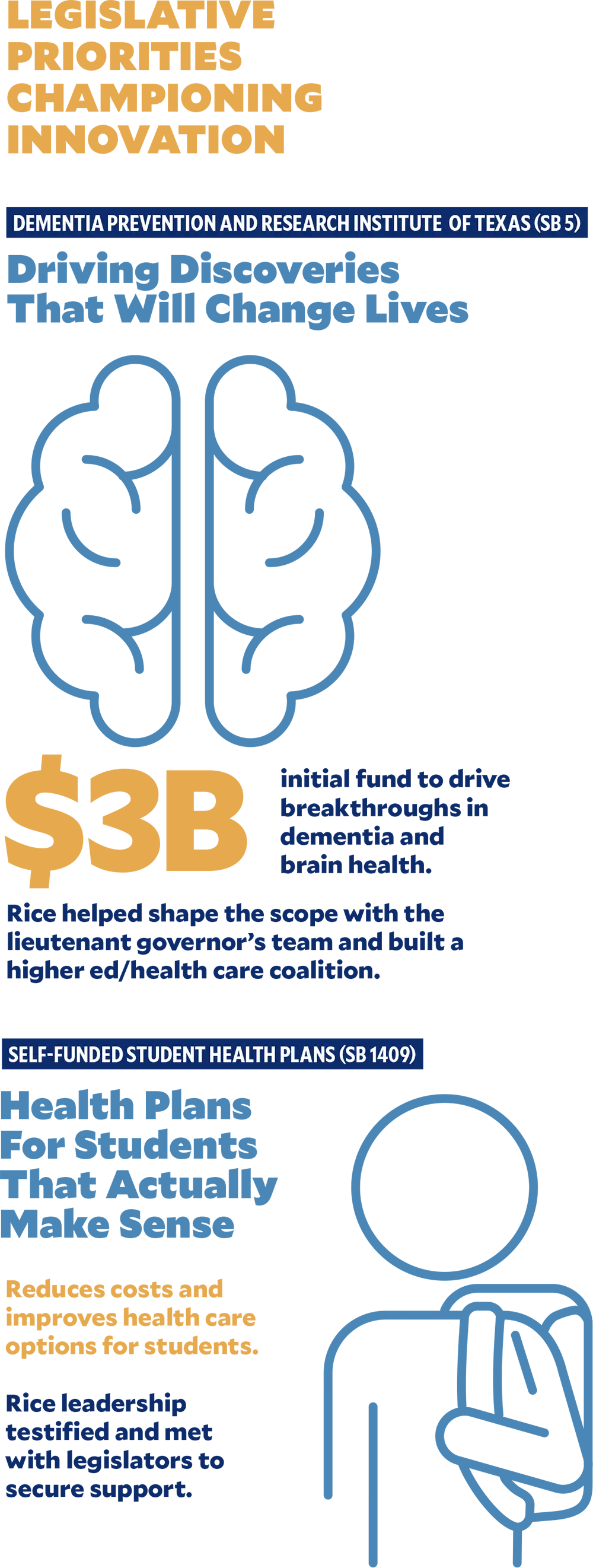The 89th Texas Legislative Session
WHERE
POLICY MEETS
PROGRESS
Rice delivers results that shape Texas and beyond.
The 89th Texas Legislative Session closed on June 2, 2025, after 140 days of policymaking and a record-setting $338 billion budget. Of the 9,275 bills filed, fewer than 1,400 passed — and Rice helped shape some of the most impactful. Rice president Reginald DesRoches made two visits to the Capitol, where Rice leadership played a key role in advancing three major priorities for the university and for Texas.
POLICY AREAS
RICE INFLUENCED
Capitol Engagement
Strategic leadership visits, testimony and coalition-building.
Higher Education and Student Health
Policies that impact students and institutions statewide.
Water and Infrastructure
Environmental expertise informing state investments.
Space and Research Economy
Expanding the scope and strength of Texas’ research leadership.
Health and Brain Science
Major funding wins and public health innovation.

MOMENTUM
AND MOVEMENT
Presence, Power, Progress
RICE DAY AT THE CAPITOL – APRIL 14
50-plus Rice students, faculty and leaders met with lawmakers.
Celebrated 50-year milestones for:
- Jones Graduate School of Business
- Shepherd School of Music
- George R. Brown School of Engineering and Computing
- Wiess School of Natural Sciences
FROM WATER TO SPACE TO NIL — RICE SHAPED THE OUTCOMES.
RESEARCH SECURITY (HB 127)
Rice worked to include private tier one universities in new security council.
COMMUNITY COLLEGE TRANSFER SUPPORT (SB 1786)
Ensures Rice receives credit for transfer students from local colleges.
WATER INFRASTRUCTURE (SB 7)
Rice expertise influenced broader funding for water solutions.
SPACE COMMISSION EXPANSION (HB 5246)
Broadened mission aligns with Rice Space Institute goals..
NIL EXPANSION (HB 126)
Enables student-athlete support before enrollment.
PROPERTY OWNERSHIP PROTECTIONS (SB 17)
Rice helped revise bill language to protect institutional interests.
FOREIGN LANGUAGE CREDIT ADJUSTMENT (SB 2431)
Rice worked to ensure study abroad credit policies remain flexible for private institutions.
GURI ELIGIBILITY EXPANSION (SB 1032) (VETOED)
Rice and other private universities would have been eligible to attract global research talent.
Bioengineering faculty testified to show Rice’s research strength.
The bill passed both chambers but was vetoed by the governor, who cited the program’s lack of funding from the legislature.